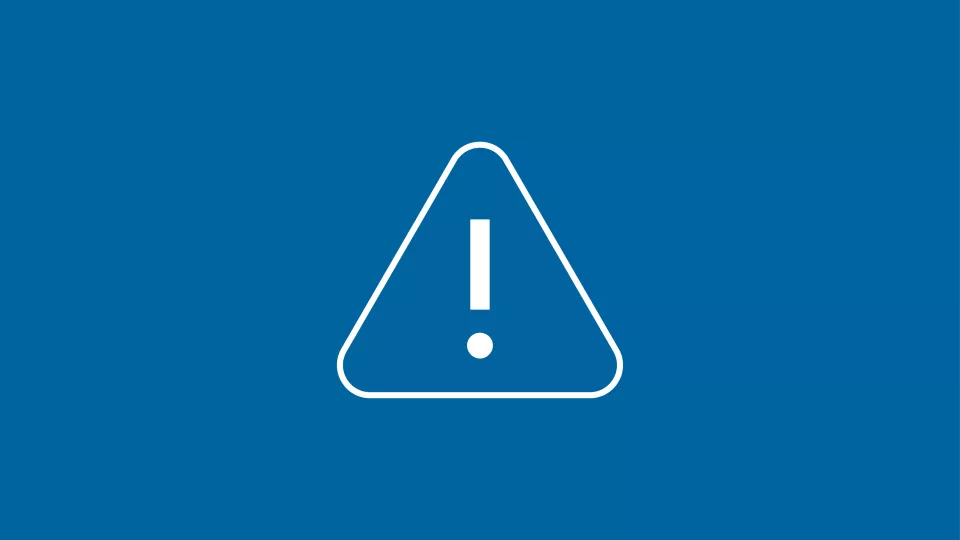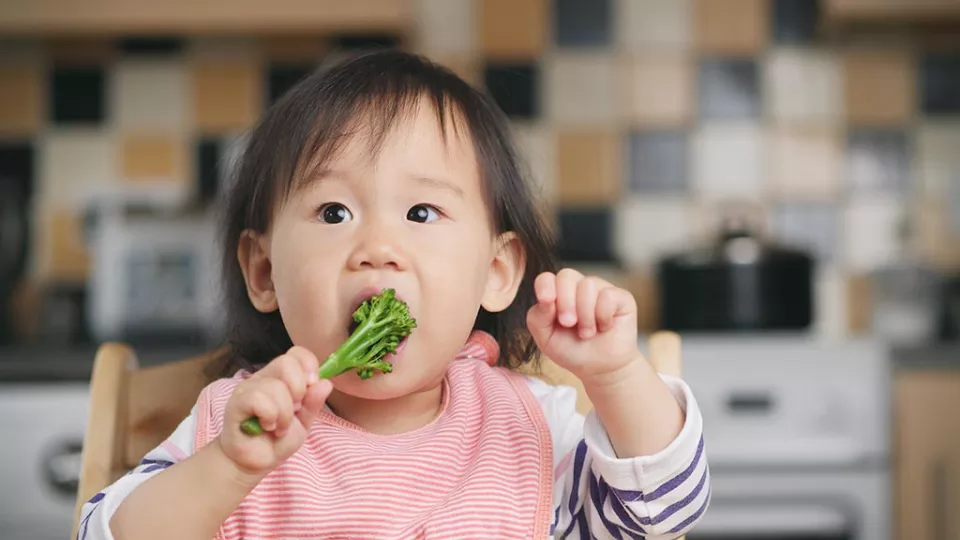
All Children’s Hospital Los Angeles locations are open.
Wildfire Support Line for Current Patients, Families and Team Members:
323-361-1121 (no texts)
8 a.m. - 7 p.m.

Your baby’s first year is full of special milestones, including the first time eating solid foods. At around 6 months, most babies can transition to food other than breast milk or formula, but some babies with special needs may not show signs of readiness at that age.
We asked occupational therapist Elizabeth Restivo and speech therapist K. Tatiana Maldonado, both from Children’s Hospital Los Angeles, to explain when it’s time for baby to get munching.
Both Restivo and Maldonado agree that parents should wait until at least six months to introduce solids to their babies. However, it’s more a question of behavior and motor development than age. Babies who are ready for solids should first show interest in food. For example, has your little one been staring at you while you eat or grabbing food from the table? Other things to look for: Babies should have good head and trunk control while sitting, be able to sit with minimal support, and be able to reach for things and bring them to their mouths.
If your baby doesn’t show all of these signs yet, Restivo and Maldonado recommend getting advice from a feeding therapist. A feeding therapist is typically an occupational or speech therapist who can meet with you and your baby to assess if they are ready to have solids introduced. They can also help with safe introduction of solids.
Most of us picture jarred purees when we think of baby food, but some experts say babies should start off eating finger foods so they can practice skills needed for chewing foods. Finger foods should be soft enough to chew but solid enough to hold, like steamed carrots or baked tofu. Offer your baby long strips of food, about the length and width of two adult-sized fingers, Restivo suggests.
If you’re not comfortable starting with foods your baby can hold, you can start with purees.
“It’s very important to allow babies to attempt to bring food to their own mouths, either via spoon or by grasping finger foods,” Restivo says. “It’s messy, but so worth it for the development of feeding skills.”
Also, purees don’t have to be bland, she says. Feel free to experiment with flavorings like spices or herbs, but babies shouldn’t eat salt or sugar yet.
“Think about adding cinnamon or other spices to oatmeal, or having baby taste the difference between thinly sliced red onion and sautéed onions,” Maldonado says.
Introducing foods doesn’t mean you’ll stop feeding your baby breast milk or formula, which are babies’ primary source of nutrition until 12 months of age.
If your child with special needs is starting solids later, seek the help of a feeding therapist to ease the safe transition to solids.
Technically, any food can cause an allergy. The ones that most commonly cause allergic reactions are cow’s milk, egg, wheat, soy, peanuts, tree nuts, fish, sesame and seafood. You should still give these foods to your baby within the first year; just start with small amounts of each. Introduce each food individually, several days apart, and on days when your baby is only eating foods they have already tried before. That way, if your baby has a reaction, you’ll know it’s from the new food and not anything else.
If your family has a history of allergies or if your baby reacts with any signs of an allergy, such as itchiness, color change or hives, talk to your pediatrician or an allergist before introducing another new food.
The following are some foods you should not give your baby because they can cause choking:
Please note, this is not an exhaustive list. In addition, there are common reasons that some foods are unsafe for babies. Hard foods and round foods are choking hazards because they mimic the size of a baby’s trachea, or windpipe. Cut foods into thinner pieces to make them safer to swallow. Think about what foods have large seeds or pits, like cherries or olives, and remove them before giving to your baby. In addition, don’t give your baby honey until after 12 months, as honey can carry spores of the bacteria Clostridium botulinum, which can make your baby sick.
Research shows the incidence of choking is equal with a baby-led weaning approach (when baby self-feeds), as compared to the more traditional approach of spoon-feeding purees, according to Maldonado and Restivo. However, make sure you are always within arm’s reach while your baby is eating.
“This is one of the major reasons we recommend sharing a mealtime with your baby, for direct modeling and for safety,” Restivo says.
The best way to promote good eating habits is to provide a variety of different foods and allow your baby to self-feed. Several studies have found that the more we expose children to many foods and flavors, the more familiar the foods become and the more likely they are to consume a wider variety of foods.
“Make mealtime happy and fun. The more we push our children to eat and create a battle at mealtime, the more they will push back,” Restivo says. She adds, though, if you have a severe picky eater who has fallen off of the weight curve, it is time to contact a feeding therapist that specializes in picky eating.
Get in touch with a feeding therapist by 6 months if your baby with special needs is not showing any signs of being ready for solids. CHLA has occupational and speech therapists who are part of a dysphagia/feeding team. If your infant is having any difficulty, the team can help you with this transition to solids.